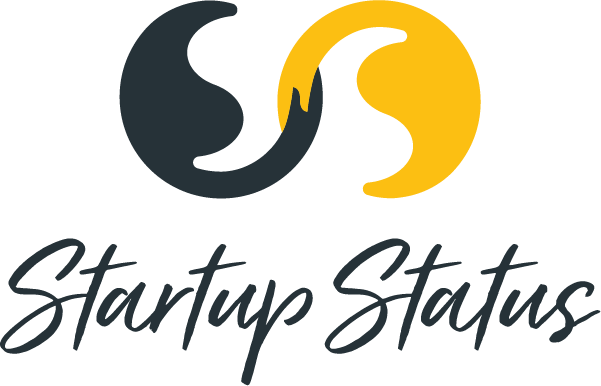We are in uncharted territory. While uncertainty is familiar to the innovation ecosystem, a global pandemic is a whole other level of complexity. Responses and reactions are emerging and changing daily as everyone tries to make sense of the appropriate response.
As of the time of this writing in Australia, we are hitting the “viral hockey stick curve” of infection. Those who support entrepreneurs – spaces and hubs, accelerators and hackathons, economic development organisations and chambers of commerce, universities and tafes, mentors and education programs, service providers and local businesses, governments and corporations, industry bodies and technology communities – are all searching for how to support businesses while remaining in business themselves.
With this in mind, Andrew Outhwaite, Dianna Sommerville and I had a chat following Andrew’s post on LinkedIn about ideas to support Australian entrepreneur ecosystem builders. This led to an online event to bring ecosystem leaders together to share and support how people can best navigate and support entrepreneurs during these times. With over 100 registrations after only a few hours, the event clearly hit a nerve.
An awareness of context can help us understand the opportunities as we head into the uncertain months ahead.
We are a young and emerging ecosystem
The majority of roles in the Australian entrepreneur ecosystem did not exist five years ago. Spurred on in part by the 2015 federal National Innovation Science Agenda and subsequent state and local programs, we have seen a rapid increase in hubs, programs, and investment groups. The graph below is for Queensland as we collect start dates for other regions. Other states have a similar pattern.
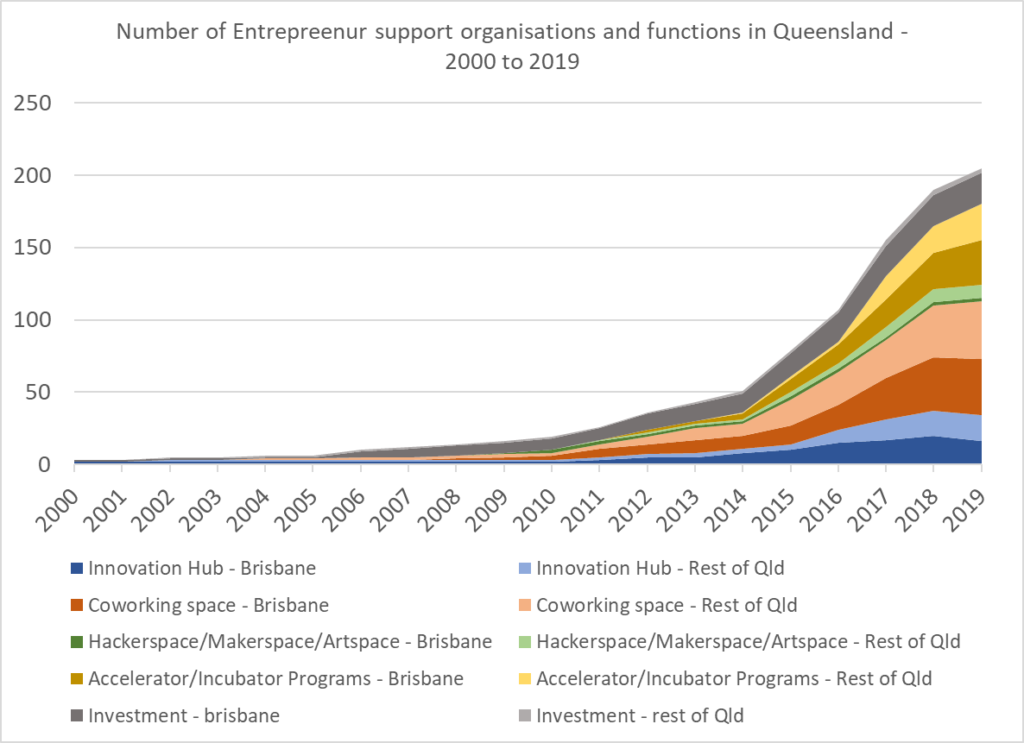
Leaders who manage spaces and programs in the ecosystem operate in a phenomenon – a constantly changing environment in a rapidly emerging field. Following the rapid growth, we are now seeing rationalisation, consolidation, specialisation, and retraction:
- Programs and hubs align with or are developed by established economic development organisations.
- Global companies expand hubs and programs into established markets that previous operated with only local operators.
- Hubs and programs are no longer ‘all things to all people’ but focus on industry sectors and targeting specific export markets.
- Hubs and programs stop operation due to leader burnout, advancement, or loss of funding.
We are seeing increasing levels of venture capital investment in Australia, which could be seen as a lag indication of success even as overall R&D spend relative to GDP decreases. Assessing the actual performance of the ecosystem is a work in progress.
And yet the recent Global Entrepreneurship Monitor report reflects that Australians continue to rank high on fear of failure. Australians do not necessarily feel that there are good opportunities to start a business or feel they personally have the skills to start a business, even though they likely know someone who has started a business and believe it is easy to start a business. These factors may contribute to Australia having the highest ranking of entrepreneurial employees as compared to relatively lower rankings for people reporting business ownership and early stage entrepreneurship.
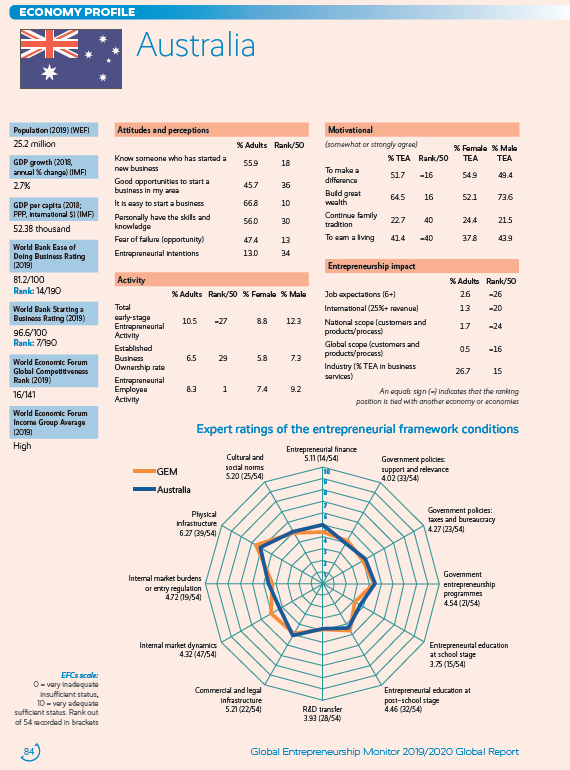
This is the environment we find ourselves in as we navigate the impacts of the virus. Our ecosystem is emerging and maturing. Leaders of hubs and programs manage in uncertain business models and a changing environment following five years of rapid growth. As a culture, we feel anyone else can give it a go but are more likely to have a fear of failure ourselves. Ecosystem leaders are needed to help entrepreneurs navigate the culture and environment, but can also struggle to define their own position in a changing market.
With this in mind, the regional nature of Australia – the lack of density and remote access – can be a point of strength we can leverage.
We are a regional nation
Australia is a regional nation, tied for the third least dense country in the world. Over one-third of the Australian population, one-third of Australian businesses, and one-third of the generation of gross regional product (GRP) are located outside of capital cities. This distribution varies by state and territory, ranging from around Melbourne’s 77% population and 87% GRP contribution for the overall state, versus a close to 50/50 contribution for Queensland. A rough table is outlined below, showing share of population and GRP for each state and for the nation.
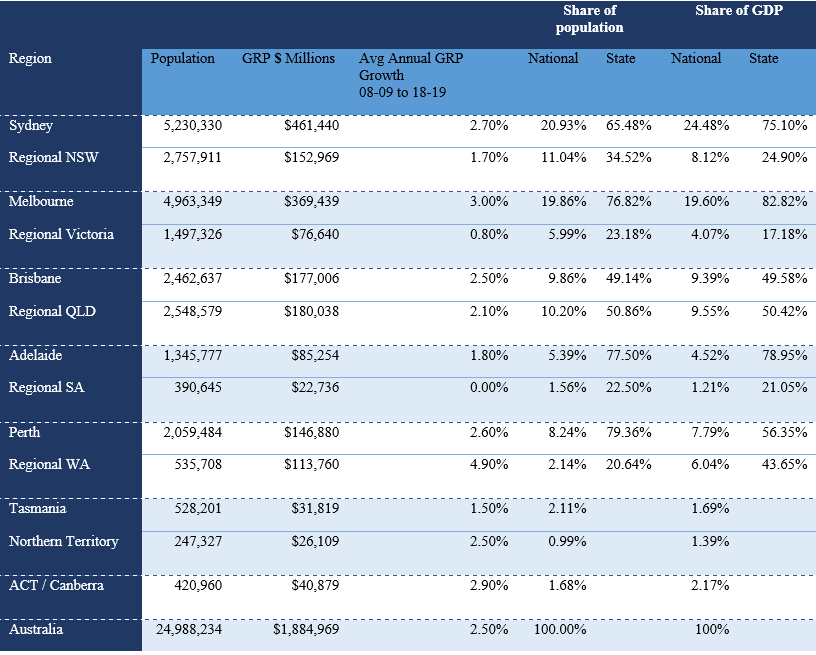
Popular convention says that innovation and entrepreneurship thrives in density and diversity. You get a bunch of different people in a closed space and magic happens. This is the underlying premise of coworking spaces, accelerators, and innovation hubs, and largely proves to be true.
Reflecting on traditional innovation indicators between regional and metro areas, regional areas can have a proportional number of new businesses. Those businesses however are less likely to apply for trademarks or patents or to invest in R&D. This can be explained in part as characteristics of industry sectors in regional areas. There are also realities of access to infrastructure, talent, services, markets, networks, technologies, and new forms of thinking that draw entrepreneurs and innovators to more dense entrepreneur ecosystems.
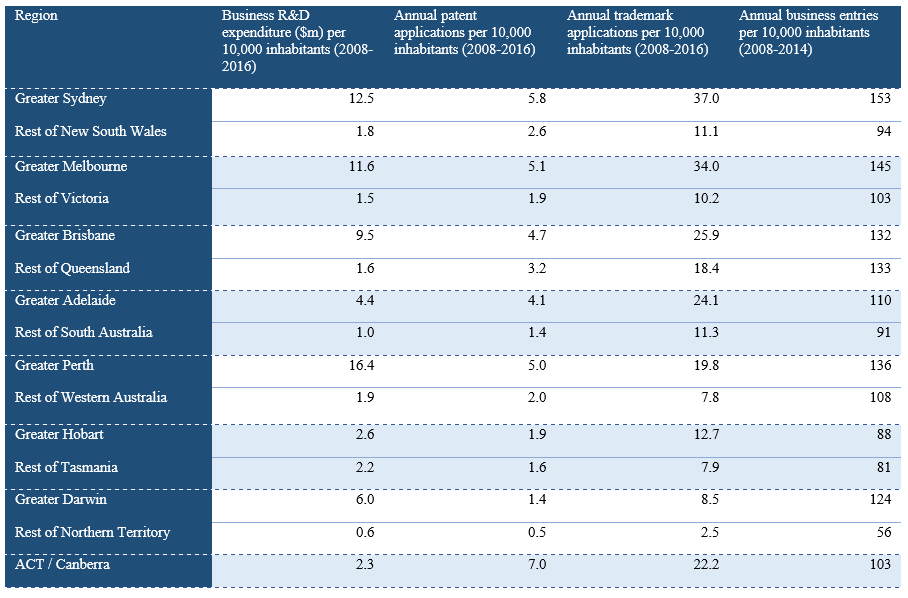
Australia will not stop being a regional nation. In a regional city, you will never fully replicate the natural collisions and physical access of a major city. Regional entrepreneur ecosystems can be developed however by replicating what you get with physical systems of population density with alternative social and digital systems. This is the thinking behind investing in regional hubs, creating new collaborative bodies, establishing hub-and-spoke investment models, building leadership capability, and establishing digital communities.
The opportunity
The coronavirus has in an instant become a potential equaliser for regional innovation. Physical events in the city were previously live-streamed as an offering to include regional communities. Now, all meetings are virtual and physical location is not relevant.
This week has seen a flood of event organisers go virtual. Events previously ‘located’ in Singapore, Sydney, or Seattle may as well be in Wagga Wagga or Goondiwindi. Accelerators manage cohorts and networks online. Universities offer virtual teaching. Regional coworking spaces and hackerspaces with business models tied to physical location will be most hit, and some are considering providing internet access or equipment for individuals while following strict cleaning, access and distance protocols. Others provide members the value of community for stay at home workers through virtual coworking sessions.
At the same time ecosystem leader access to personal development and global networks has become more accessible than ever. Startup Commons is offering their ecosystem leader development program for free. The Kauffman Foundation in the US has created a Facebook Group to support ecosystem leaders looking for ideas. A new slack channel in Europe supports ecosystem leaders in connecting through the crisis. The global support network will continue to mobilise as national boundaries diminish in an increasingly virtual world experienced from home offices.
In my research of Australian regional ecosystems over the past three years, I interview and survey regional innovation hub members to ask the value they place on the hubs and spaces. Their response is includes community, mentors, networks, and support. Physical space always ranks at the bottom of their responses.
Tomorrow we are holding a workshop for ecosystem leaders about the challenges and opportunities related to the coronavirus. In a survey as part of the application process, over 75% of respondents indicated their greatest opportunity was to develop virtual models of delivery and support their communities through new business models. The opportunity aligns with what their members are looking for.
The impacts of the coronavirus are significant and will change how we all do business. But as we head into the new way of operating, ecosystem leaders are well positioned to facilitate connections, provide access to networks, and support businesses to adapt to new business models. This has always been the primary value proposition of the ecosystem builders and their coworking spaces, hubs, and programs. A crisis often mandates that we return to our core, and this may be the case for hubs and programs.
The next several months will be a challenge unlike the modern world has seen. Communities will be looking for support in how to develop new business models, access networks and resources, build capability, and develop new ideas. Many ecosystem leaders are already adept at providing this support, outside of attachment to physical space. This is especially the case for leaders in regional Australia who have had to navigate uncertainty and challenges over the past several years.
I do not make light of the direct impacts of the virus on personal lives and businesses. But looking across the entrepreneur ecosystem of Australia, there is a likely cohort of incredible leaders who can provide value to communities in need.
Additional thoughts, feedback, and ideas are always welcome as we continue to build the community of practice.
